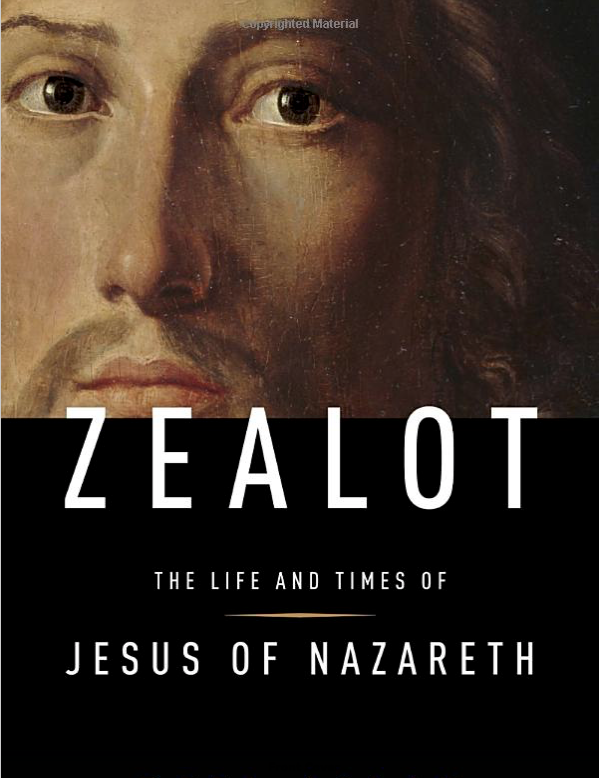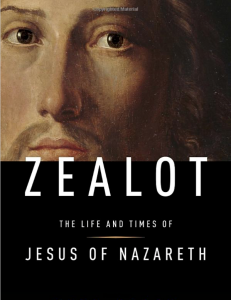
Book Review: Zealot: The Life and Times of Jesus of Nazareth by Reza Aslan
- By Charlotte Odenson --
- 03 Jan 2020 --
 Because it’s that time of year, I took the opportunity to read a much debated but fascinating book about the historical Jesus, Zealot: The Life and Times of Jesus of Nazareth by Dr. Reza Aslan.
Because it’s that time of year, I took the opportunity to read a much debated but fascinating book about the historical Jesus, Zealot: The Life and Times of Jesus of Nazareth by Dr. Reza Aslan.
Dr. Aslan became an evangelical Christian in high school but, in his later historical research, found himself drawn back to the religion of his fore-fathers, Islam. However, in writing this book, he has stated that “once I detached my academic study of Jesus from my faith in Christ, I became an even more fervent follower of Jesus of Nazareth. What I mean to say is that I live my life according to the social teachings preached by Jesus two thousand years ago.”
Utilizing historical records and comparing them to the gospels, Aslan (who can translate directly from the Greek texts himself) presents a compelling and exceptionally readable history of Jesus, within the social, religious, and political context of the era. It was a time of upheaval for the Jews in Judea, with a brutal Roman occupation, and they eventually erupted in riots and violent protests against the Roman rule. In the countryside, “messiahs” crowned themselves while they and their followers plundered the royal places.
Dr. Aslan defines “zealot” as “those Jews who adhered to a widely accepted biblical doctrine called zeal. These ‘zealous’ Jews were strict nationalists who preached the sole sovereignty of God. They wanted to throw off the yoke of Roman occupation and cleanse the Promised Land of all foreign elements.” He sees Jesus as a follower of the Zealot doctrine.
The book gives us more background on all the well-known participants, Herod, Pontius Pilot, the high priest Caiaphas, the Apostles, John the Baptist, but presents them all within the context of history and from more sources than just the New Testament. In fact, the main book is followed by almost 100 pages of Notes and Bibliography.
Aslan takes us through hundreds of years of Jewish history, filled with prophets, high priests, and brutal dictators, while also introducing the lives and daily routines of common peasants and workers such as Jesus and his family.
Aslan works to explain the contradictions between the Biblical references and the historical record and the contradictions within the Gospels themselves. He also theorizes on why the Christian Church ultimately mostly disregarded the followers of James, Jesus’ brother, and chose to include more of the writings of Paul above any other author in the New Testament, re-shaping the Christian Church and illuminating how Jesus the Man became Jesus the Christ.
Aslan acknowledges the miracles attributed to Jesus, but he makes clear that there were other “prophets” and “messiahs” during the same time also performing miracles and “magic.” In fact, the claim to be “King of the Jews” was a common one. But Aslan says he is not so concerned with what others thought Jesus was, but wants to understand what Jesus himself thought he was.
In fact, Aslan claims that “the gospels are not, nor were they ever meant to be, historical documentations of Jesus’ life. These are not eyewitness accounts of Jesus’ words and deeds. They are testimonies of faith composed by communities of faith written many years after the events they describe. In other words, the gospels tell us about Jesus the Christ, not Jesus the man.”
This obviously puts Aslan in contention with Christians that believe every word in the New Testament is indisputably a true historical record. However, Aslan makes his case in a respectful and purely academic way that is compelling and absorbing.
For anyone who wants to understand more about the life and times of Jesus, this is a fascinating and easily read work that places well-known events and people in a setting that brings context to some of the most significant events in history.
Dr. Reza Aslan’s bachelor’s degree is in religious studies, with an emphasis on scripture and traditions (which at Santa Clara University means the New Testament). His minor was in biblical Greek. He has a master of theological studies degree from Harvard University, in world religions, and a Ph.D. from the University of California, Santa Barbara, in the sociology of religions.




















